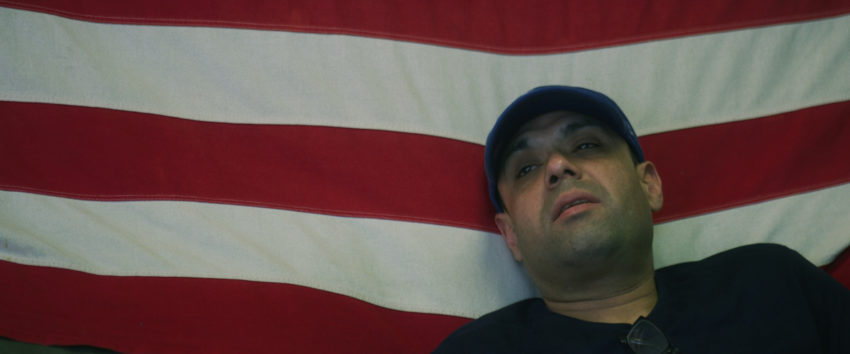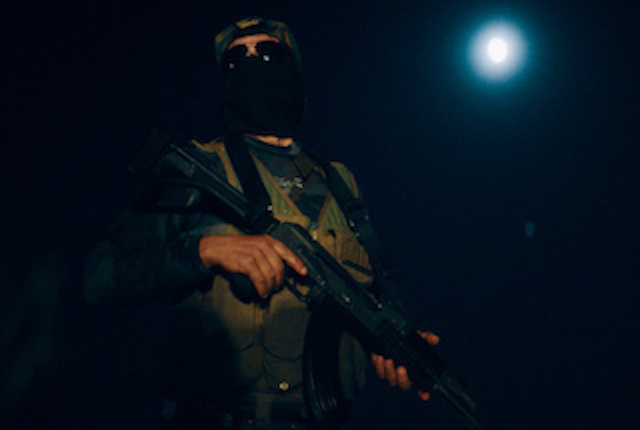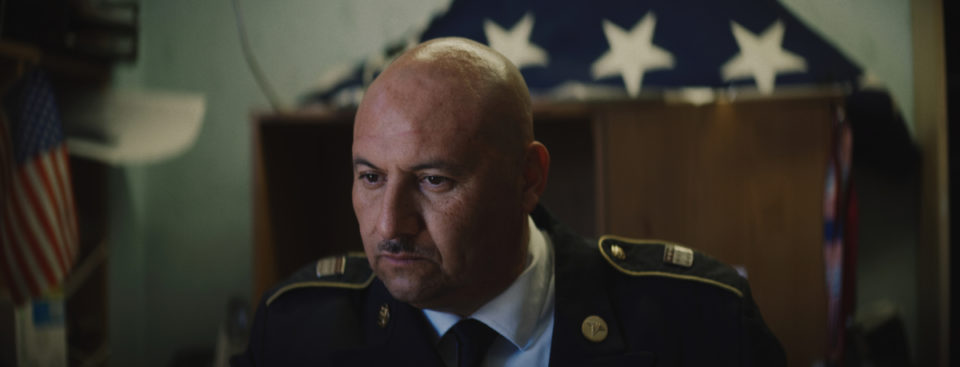
Miguel Perez in READY FOR WAR. Photo Credit: Jeffrey Peterman/Courtesy of SHOWTIME.
HOLLYWOOD, CA (LA ELEMENTS) 11/26/2019- “My son enlisted when he was barely 21 years old,” says Esperanza Perez, mother of army veteran Miguel Perez . “A healthy, intelligent boy with goals, with plans, with dreams. But unfortunately, that’s when 9/11 happened. One day he called us and he told us he had to go to Afghanistan. It was painful to say goodbye. And then he was in that explosion. He was wounded in combat and he was no longer the same, he was a different Miguel. At the time, we did not know that he had PTSD. I would accompany him to the veterans hospital. We spent hours waiting for them to attend him and they never saw him. I think about how the system they go out to defend, that they fight to defend, fails them tremendously.”
Miguel Perez, who suffered two traumatic brain injuries during his service, is one of the deported US military veterans profiled in the Showtime Documentary, Ready For War, which screened at this year’s AFI Film Festival on November 19th and 20th at the Chinese Theater in Hollywood.
Directed by Andrew Renzi, Ready For War moves at a fast pace. Within its 90 minute running time, this film succeeds in educating its audience as to how it was possible that US military veterans who were born outside the nation that they served, could end up being deported back to their country of birth. Away from the country that they put their lives on the line for.
One event that Ready For War reveals to be responsible for the increased number of deportations, is the 1996 Illegal Immigration Reform and Immigrant Responsibility Act. Signed into law by President Bill Clinton, this law expanded the list of deportable offenses. That legislation along with the difficulties soldiers face in readjusting to civilian life, (especially those who have seen combat) has served to set in motion the removal of thousands of veterans. Among them are the three featured in this documentary, Hector Barajas, Miguel Perez and “El Vet.”
All three soldiers were born in Mexico and what Ready For War does so well is to connect us with each of them. The odyssey that Barajas and Perez endure in their quest to return home is thoroughly detailed. This includes interviews with the politicians and lawyers who tirelessly fight on their behalf. And yes some how, some way, you get a glimpse of the inside of the ICE prison facility where Perez was held in Kenosha county Wisconsin. This is no small achievement considering how these types of facilities are notorious for being cut off from just about all media coverage. While Barajas and Perez have their families and their advocates fighting along side them in their quest to return to the US, it becomes painfully obvious almost immediately that “El Vet,” can never come home. More on him later.
Hector Barajas
Barajas is a decorated army veteran of the 82nd Airborne Division. Born in Zacatecas, Mexico, raised in Compton, California, he served from 1995 until he was honorably discharged in 2001. In the film, he reads a letter explaining why he joined and what led to his being deported away from home. “You joined the US military for many reasons. You wanted to get away from the neighborhood you grew up in, promise of citizenship, education and career. Most importantly, serving your country. Being a GI Joe.”
After his honorable discharge, Barajas does not find life as a civilian easy and he turns to drugs and alcohol. There is an incident at home where someone fires a gun at a car and he ends up going to prison. Instead of parole, ICE picks him up leaving him to ponder, “This can’t be. You served in the military. How could they deport you?”
While in Mexico, Barajas struggles, especially as he has a daughter back home in California. However, it is also during this time that he founds The Deported Veterans Support House. Known as “The Bunker,” this facility helps deported veterans by providing shelter, assistance with securing their benefits and even jobs. Despite enduring years away from the United States, Barajas never gives up on his dream to return home. A dream aided by San Diego County Supervisor, Nathan Fletcher, who served in the Iraq War as a marine.
Fletcher, reveals that at one point, he too believed that veterans could not be deported. In denouncing the treatment of deported veterans, he states, “There’s one category of veterans who are primarily white and happened to have been born here. When they lose their way and commit an offense, we have a veterans court and we have treatment, we have diversion programs. But for that other category of veterans who wore the same uniforms, who slept in the same mud, and who fought in the same battles, for that category of veterans we have diversion treatment as well. We divert you back to a country that you may or may not know.”
Miguel Perez
Miguel Perez, a devout Cubs fan, was raised in Chicago since he was eight years old. He enlisted in the army where he was deployed twice to Afghanistan. While in service, he was wounded and this resulted in him coming home with PTSD. Subsequently, he served 8 years in prison for a non-violent drug charge, which cost him his green card and resulted in his deportation to Mexico.
A powerful moment in Ready For War comes when Miguel Perez senior defends his son to the media. Speaking in his native Spanish, he makes the poignant observation, “Does anyone know what war is like? Only those who’ve been to war know what war is like. My son went there to defend the constitution, and to defend the flag, and he came back injured. And now the constitution won’t defend him.”
This documentary reached out to a few high-profile veterans advocate who are indeed among“those who know what war is like.” Besides the afore-mentioned Fletcher, Illinois Senator Tammy Duckworth who lost both of her legs while serving in the Iraq war is also interviewed.
“So, most Americans would be surprised to know that we deport veterans,” says Duckworth. “Because, they’d be surprised to know that we actually have people who serve this nation in uniform, who will swear that they would lay down their lives to protect our freedom, who are not yet citizens. Who are green card holders, permanent legal residents. These folks would not be deported had they been granted their American citizenship in the first place. We now have a population in places like Tijuana of American veterans who are still deserving of veterans benefits but who can’t get access to them and can’t even come back into the country that they defended.” Duckworth has continued her advocacy by introducing bills aimed at stopping the deportation of soldiers and their families.
Ready For War follows Perez to Mexico shortly after his deportation. You see up close the devastating impact this has on a man already struggling with PTSD. No matter which side of the immigration debate you’re on, he makes you assess the unfairness of his situation. “I went and risked my life for this country, not for Mexico but for the United States,” says Perez. “And now the same country, the same people that we risked our lives for, are allowing and are supporting and authorizing my deportation like, ‘thank you for your service now you need to go.’ Home is where the heart is. My heart, my son and daughter make up part of my heart in Chicago. The Cubs, the Bears, my father – in Chicago. This can never be home.”
One of the most touching scenes in the documentary shows Miguel Perez after he has been deported to Mexico. He has barely any medication left for his PTSD and he is facing the wall that separates Mexico from the United States. His eyes are closed and he is praying.
“El Vet”
Out of the three stories of the veterans profiled in Ready For War, the most chilling and tragic of all is the one of “El Vet.”
Director Andrew Renzi did an exhausting amount of research to give us some semblance of the man whose full face we will not see and whose real name we will not know. It has to be this way because this army veteran ends up being a soldier for the Juarez cartel.
It speaks to the dedication of Renzi that he was able to get an interview inside Chihuahua State prison with the Juarez cartel “officer” who first recruited “El Vet.” “The guy needed money, he was completely broke,” says El Chapon a “lieutenant” in the Juarez cartel who is serving 50 years in prison for being a cop killer. “Yeah, there’s a lot of veterans that were in war. They got out all crazy and come over here. And we offer them something nice. They train us to use guns. They don’t give a shit about killing. All these vets are crucial to us.“
This highlights the warning that US Marine, Daniel Torres, makes in this documentary, “You don’t want drug cartels to have military training, but you are creating a scenario where they could.”

El Vet in READY FOR WAR. Photo Credit: Jeffrey Peterman/Courtesy of SHOWTIME.
“El Vet’s” works for the Juarez cartel by training its members in the use of firearms and hunting down rivals who are selling meth. He is present when a rival cartel member is having information tortured out of him. You know this because he is the one who has shot the video of the interrogation. On film, his videos are mercifully short and faces are not identifiable. Yet even that is not enough to dull the impact of the horror you feel as you watch what you are watching. And hear what you are hearing. One video shows a brutalized and terrified Sinaloa “soldier,” right up to the point of his murder.
It is truly unsettling to relate the man who shot those videos with the young, idealistic man he used to be. Someone who used to believe that his life would change for the better if he joined the military. “I joined the service because I wanted respect for myself. For my family. I wanted something to be proud of. I needed some discipline in my life and so I joined the Army. We were proud. We were helping people. We were good soldiers. And all of a sudden, things just changed for me dramatically. I got into some trouble. I committed an assault on another dude for shitty stuff. It was a necklace and the government just threw me out.”
“El Vet” was deported 9 years prior to the filming of the documentary. Upon deportation, he was dropped off in the heart of cartel activity in the city of Juarez Mexico. “Being here in Juarez, I wasn’t used to the life here. I miss the US. When I got here back in 2010 it was like a horror movie. I was alone. Because of all that I left in the US, it hit me hard… Everything here is drugs and death. There’s nothing else.”
For a man who accepts that his life will now revolve around drugs and death, what did he have to gain by cooperating with the making of a film like Ready For War in the first place?
“Well, the main reason is because some people might judge me because of what I’ve done. But they don’t really know my life. People don’t know what I’ve been through. And I’m not saying I’m a victim but at least I have the guts to stand up and say what I am. A clean-up guy. I clean up the garbage. And I’m giving the opportunity here to provide what I know, what I’ve seen, what I’ve been through because this is sick. What goes on here is sick. There’s no other word for this. “
“El Vet” and indeed the documentary itself serves as a cautionary tale for both the soldiers drafted onto the wrong side of the drug wars and for the country that “threw them out.” The unintended result is the emergence of expertly trained cartel soldiers who are better able to keep the drugs moving into the US.
Through the interrupted and damaged lives shown in this film, there is something else that Ready For War evokes: In the rush to be tough on crime, the sacrifices made by men and women who enlisted in the military without any guarantees that they would even make it out alive, are being overlooked. As Torres states towards the end of this film, “The United States is a beautiful experiment. But it’s not an experiment that’s going to sustain itself. It’s an experiment that it takes every individual to protect and no one knows better than veterans. Veterans understand this. And you’re deporting United States veterans? Honorable discharged veterans? You’re deporting them? You’re kicking them out? You’re most loyal men and women, those who stood up for you? Those who are broken inside because of their service? It ain’t right. It might be lawful, yeah definitely it’s lawful, it’s lawful to deport a United States veteran, but it’s not just and it’s definitely not American.”
You can watch the official trailer right here.
We reached out to Director Andrew Renzi to learn more about the making of Ready For War and the people featured in his documentary.
Why did you decide to focus on the subject matter of Deported Veterans?
I heard about the issue of Deported Veterans by way of Hector Barajas. And then my producer and I took a trip down to Tijuana where we met him and heard about the work he was doing to try and help other deported vets get their benefits and fight for citizenship. After that we went to Juarez and met a journalist named Luis Chaparro. It was in Juarez that we started meeting deported vets that had been forced into labor by the cartels because of their military training. Once we learned about this aspect of the story, we knew we had to make the movie.
How long was the actual filming of Ready For War?
A little over two years.
Daniel Torres, who is featured in your film offers valuable insight on the current situation of deported veterans. Can you tell me a little bit more about him? I believe in your film he is simply mentioned as US Marine.
Daniel was actually living in Mexico, having voluntarily left the US after facing an issue re-entering the country from Europe. He had to fight to come home much like Hector did, and eventually was granted his citizenship. He’s an amazing guy, and is either a lawyer or studying to be a lawyer.
In your documentary, the three veterans profiled, Hector Barajas, Miguel Perez and “El Vet,” seem to have a lot in common besides their deportation. Honestly, all three seemed to come from loving families. It’s obvious with Miguel Perez in how hard his parents fight for him. And the home movies of Hector Barajas and El Vet show a loving home growing up. After being deported, Miguel had the advantage of “The Bunker,” to help him adjust to life in Mexico, Barajas and “El Vet” did not. What do you think was the driving factor that made “El Vet” choose the path that he did?
I don’t think he had much of a choice and once he started to go down that path, he embraced the idea that he had become a monster and felt there was no turning back.
During the shooting of your film, did you ever feel that your life was in danger?
Yes, there were several times. The most dramatic of the situations was after the first day filming with “El Vet.” We were debriefing at a bar and he pulled me aside and asked me if I was DEA. When I said no dismissively, he looked me square in the eyes and said that I had to prove it right then or else he was going to kill me and kill my crew. Trying to keep as composed as possible, I pulled my phone out and Googled my own name in hopes of finding something from my past films. On Google, there happened to be a picture of me and Richard Gere, and El Vet saw it and said, “Pretty Woman? You know him?” And it was Richard Gere’s picture that convinced him I couldn’t be DEA.
I know that due to time constraints, there must have been footage of your film that was left out. What was left out if anything that you would like to address?
We filmed with many other characters that didn’t make the final cut, and all I can say is that I hope to reopen that footage and share some of the other stories that we found along the way.
What are you hoping to accomplish with this documentary?
I would love to see legislation passed at the federal level where honorably discharged veterans automatically receive their citizenship. So we never have this happen again.
How did Drake become involved with this project?
I was very lucky that the project ended up in front of his amazing producing team. And it seemed to align with the type of things they wanted to support. Very lucky. Those guys are incredible.
What is next for you?
I’m exploring a film that is very similar to Ready For War but about a different crisis facing our nation and our relationship with Mexico.
Director: Andrew Renzi
Producers: Nick Boak, Andrew Renzi, Kerstin Emhoff, Jason Schrier, Anthony Gonzalez,
Executive Producers: Drake, David Ayer, Vinnie Malhotra, Chris Long, Tara Long, Adel “The Future” Nur
Director of Photography: Jeffrey Peterman
All photography including cover photo of Hector Barajas by Jeffrey Peterman courtesy of Showtime.
Follow LA ELEMENTS on Instagram and Twitter. Like us on Facebook.




No Comments